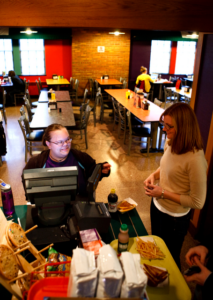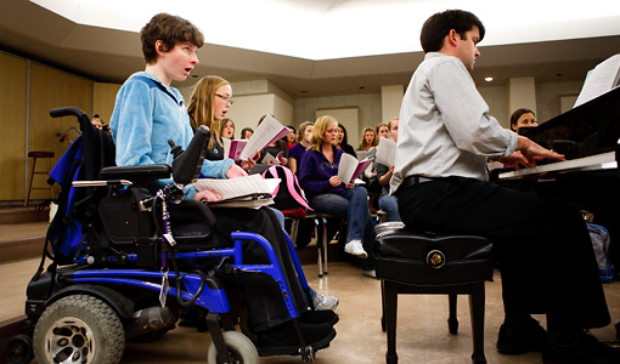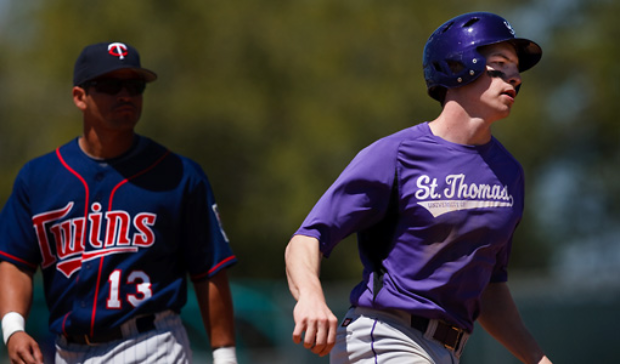I love being a sophomore,” Ann Motl says. “It’s much better than freshman year, when everything was so overwhelming.” Notes all over her tidy residence hall room belie a busy schedule – four courses plus Women’s Choir this semester. She’s excited about her mechanical engineering major and is thinking about graduate school. Friends greet her warmly as she zips along to her first-floor Flynn Hall room.
She especially likes her remote-control door opener. It’s just one of the tools St. Thomas provides through the Enhancement Program, a package of services the university offers to qualified students with disabilities.
Motl, who grew up on a dairy farm in Staples, Minn., has Charcot-Marie-Tooth (CMT), a degenerative nerve disorder that has cost her the use of her arms and legs and is weakening her voice. But this isn’t a woman who spends a lot of time thinking about burdens. In fact, Motl describes herself as pretty “low-maintenance” and would rather tell you how much fun it is being a city girl and living on her own this year.
Motl’s mom, Kim Harff, stayed with her on campus for the first two weeks of freshman year, helping her to get acclimated to college and begin life on her own. “The first month was the worst,” Motl said. Besides a small army of personal care assistants to help with tasks many of us take for granted – like getting out of bed in the morning, getting dressed and eating lunch – Motl needed accommodations in the classroom, too: notetakers in class, extended time on tests and voice-recognition software so she could write papers and keep up with assigned class work.
Through it all, Kimberly Schumann, director of St. Thomas’ Enhancement Program, helped the Motls navigate the red tape of government funding, hire a reliable agency for Ann’s personal care and arrange for just the right combination of technological wizardry and TLC to help her make the most of her college days. It’s working out great, she says.
The Enhancement Program does just that: It smoothes the speed bumps of the university experience for students whose disabilities could otherwise impede their education. “Our goal is to encourage and prepare students to be independent, to be self-advocates,” says Schumann, who joined St. Thomas in 1997 and has led the program since 1999.
Schumann calls the Enhancement Program St. Thomas’ “reasonable effort” to provide, to qualified students with disabilities, equal access to all university courses, services, programs, employment and facilities. “St. Thomas accommodated students with disabilities for a number of years, and the AmericansWith Disabilities Act of 1990 mandated that we do that,” Schumann said. “But we do some things above and beyond.”
"The Enhancement Program smoothes the speed bumps of the university experience for students whose disabilities could otherwise impede their education."
That’s a bit of an understatement. With a bachelor’s degree in psychology and a master’s in counseling and student affairs from Minnesota State University-Moorhead, Schumann has devoted her career to building a comprehensive program of services for St. Thomas students – undergraduate and graduate alike – with disabilities. Involved with the Association for Higher Education and Disability, she evaluates applications for and arranges accommodations, tracks student progress, consults with faculty and staff and interacts with family members. She also serves on St. Thomas’ Flag Team, a group of faculty and staff who work to identify and assist at-risk students.
This year the Enhancement Program serves more than 300 undergraduates and nearly 50 graduate students who have documented disabilities of some kind. Most common are the “invisible” learning disabilities in reading, mathematics or information processing or psychological disabilities such as depression, post-traumatic stress and anxiety disorders. Students with physical disabilities, such as hearing, vision and mobility impairments, and those with chronic medical conditions, such as multiple sclerosis or cancer, make up the balance.
Enhancement Program services include residence hall as well as classroom accommodations. UST has wheelchair-accessible rooms with roll-in showers and strategically placed grab bars. The program has met requests for bed-shaking alarm clocks and phones that caption for hearing-impaired students, single rooms for students whose psychological health depends on it, bare floors for those highly allergic to carpet glue and even in-room cooking facilities for those with special dietary needs.
In class, accommodations can be as simple as asking faculty to allow a student to take his tests alone in a private room; people with Attention Deficit Disorder, for example, often do much better without the distraction of other students nearby. Other accommodations call for more complex arrangements.
Scot Atkins, a candidate for a doctoral degree in organizational development in St. Thomas’ School of Education, is deaf. Living in Rochester, N.Y., with his wife, Sally (Waltz) Atkins M.B.A. ’03, he is director of organizational development and human resources for Interpretek, a national interpreting agency. So he knows good sign-language interpreters when he sees them. His assessment? “They were fantastic.” They even accompanied Atkins on a weeklong practicum in Ukraine last year.
In recent years the university has spent more than $100,000 each year for outside services to enable students with disabilities to do their best. The Enhancement Program contracts Paradigm Reporting and Captioning, a Twin Cities-area agency that employs the Internet and Skype software, for turning voices into text for real-time captioning, right in the classroom. ASL Interpreting Services, a Corcoran, Minn.-based agency, provides American Sign Language interpreters for the St. Thomas students who are deaf or have hearing impairments.
Faculty also contribute special skills to their work with disabled students. Atkins fondly remembers the late Dr. Sharon Gibson, an Organization Learning and Development Department professor who died in June. Gibson “went out of her way to provide a positively challenging learning environment for me,” said Atkins, who discovered that Gibson was an ASL interpreter early in her career.
“My biggest challenge, of course, is educating people about my deafness and making people aware of communication needs in the classroom,” Atkins said. “I’ve learned to speak up about that.”
Attorney Michael Silla, a recent UST School of Law graduate who now works for the Wisconsin Office of the State Public Defender, would agree. He can’t see with his right eye nor hear with his right ear, due to benign tumors discovered in his 20s.
The Enhancement Program provided real-time captioning so Silla could read along in faculty lectures. Still, class time could be frustrating and even isolating, depending on room acoustics and some human factors, too: Although his fellow law students and faculty were helpful and friendly, he had to remind them to face him when they spoke and to avoid talking all at once. “It’s a constant process of educating and re-educating people. You have to ask for what you need,” Silla said.
Silla hopes that someday St. Thomas will be able make the most of the technologies in its “wired” classrooms to feed audio directly to student laptops from classroom microphones. That would help some hearing- impaired students to overcome the acoustical issues often present in large classrooms: echoes, “dead” spots and background noise.
Even so, technologies to assist people with disabilities have increased exponentially in recent years, and St. Thomas students have access to some of the best. Dragon Naturally Speaking software, for example, converts speech to text for those with written language disabilities and mobility impairments, while Kurzweil Educational Systems provides text-to-speech software for blind and visually impaired readers and readers with reading disabilities. Something called Zoom Text magnifies computer screens, and a growing collection of audio books is available in the Enhancement Program office.
Much of the time, the Enhancement Program involves creative problem solving and advocacy for students with disabilities. For Theresa Windsperger, a sophomore Catholic studies major from Delano, Minn., that means getting approval for priority registration so she can arrange her course schedule more flexibly. Windsperger has achondroplasia dwarfism, and her short limbs and bouts with arthritis make those long walks between classes quite difficult. So classrooms have been changed to accommodate her journeys, thanks to some UST Facilities Scheduling office magic.
advocacy for students with disabilities. For Theresa Windsperger, a sophomore Catholic studies major from Delano, Minn., that means getting approval for priority registration so she can arrange her course schedule more flexibly. Windsperger has achondroplasia dwarfism, and her short limbs and bouts with arthritis make those long walks between classes quite difficult. So classrooms have been changed to accommodate her journeys, thanks to some UST Facilities Scheduling office magic.
Windsperger appreciates the opportunity to be part of a campus community where she’s able to take full advantage of opportunities other students enjoy. She has a cadre of friends and a Dowling Hall roommate whom she calls “awesome.” She looks forward to learning American Sign Language this summer. She’s exploring the possibility of religious life or becoming a youth minister. She has a work-study job as a cashier in The Grill, a hub of the St. Paul campus. As she stands on a stool to work the register, smiling and greeting her customers, it’s easy to see how her presence – and that of students of all abilities, ages, creeds, colors and origins – enriches the life of the university.
The Enhancement Program’s Schumann reminds, “It’s important to remember that ‘different from’ has often meant ‘less than’ for these students.”
Not anymore, says Windsperger. “I’m unique – just like everybody else!”
About the author: Pat Sirek is the associate director of the St. Thomas News Service.





